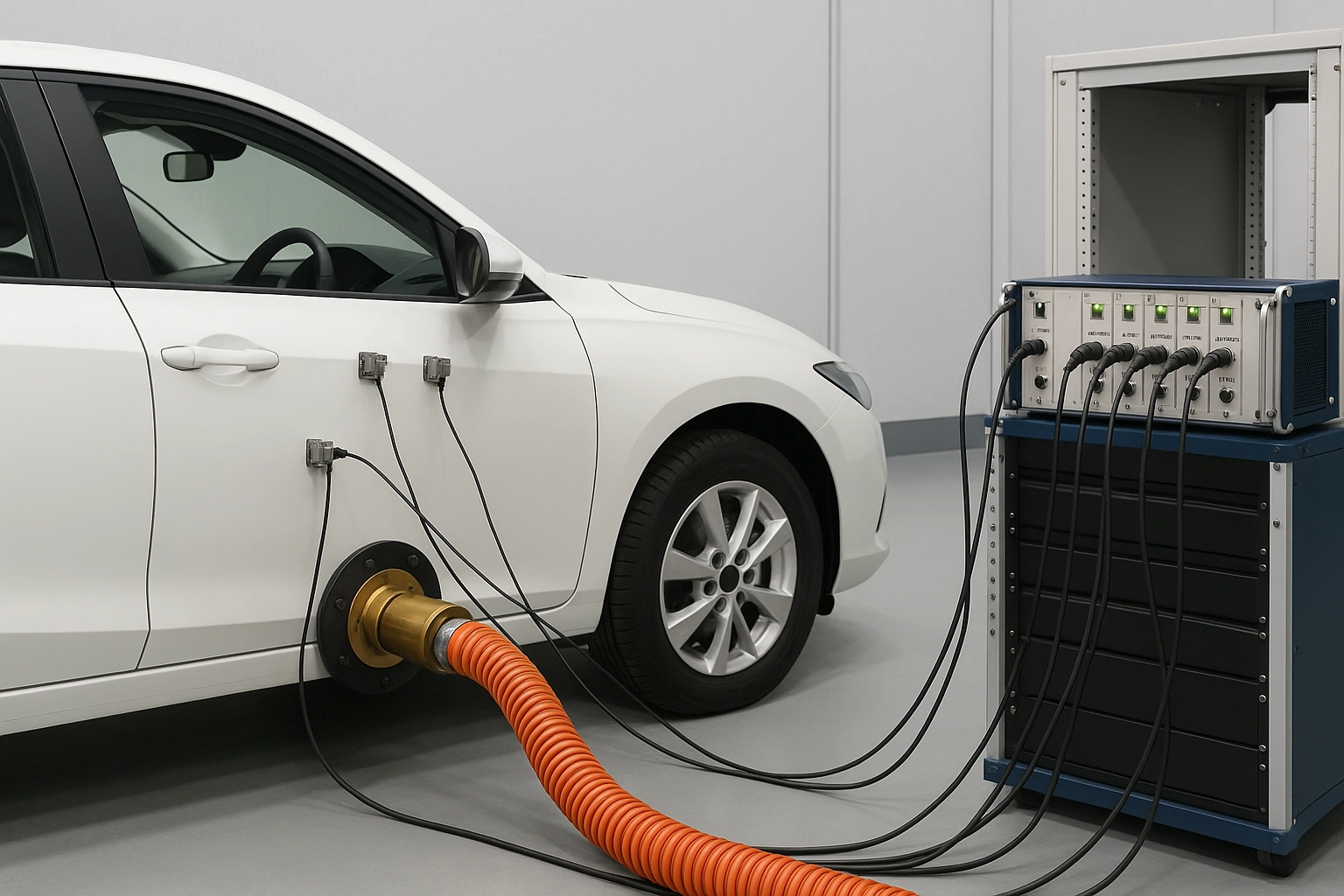ASTM E1050 Impedance Tube Sound Absorption Test
The ASTM E1050 Impedance Tube Sound Absorption Test is a critical procedure used to determine the sound absorption properties of various materials in controlled environments. This test, as specified by ISO 364-2:2008 and ASTM E1050, evaluates how effectively a material absorbs sound energy rather than reflecting it back into the acoustic field.
The process involves placing a specimen at one end of an impedance tube while pressurized air is supplied to the other. The sound waves generated within this tube are reflected from both ends and interact with the specimen placed in the middle. By measuring these reflections, the test calculates the absorption coefficient of the material being tested.
This method provides valuable data for quality managers and R&D engineers working on reducing noise levels in automotive interiors. Sound absorption coefficients help in selecting appropriate materials that can effectively dampen unwanted noises such as rattles or vibrations caused by engine operation, road impacts, or wind resistance. Compliance officers also find value in this test as it aligns with international standards ensuring products meet regulatory requirements.
The impedance tube sound absorption test is particularly useful for automotive manufacturers who need to optimize their vehicle interiors. It allows them to choose materials that not only look good but also contribute positively towards creating a quieter, more comfortable driving experience. The test ensures that the chosen materials do not just enhance aesthetics but also improve overall vehicle performance by minimizing noise pollution.
By using this testing method, manufacturers can ensure their products comply with stringent international standards like ISO 364-2:2008 and ASTM E1050. These standards provide a standardized approach to measuring sound absorption which ensures consistency across different laboratories worldwide. This standardization is crucial for maintaining quality control throughout the supply chain.
Moreover, this test offers insights into how various materials perform under specific conditions relevant to automotive applications. For instance, it helps assess whether certain fabrics or foams used in car seats effectively absorb sound at frequencies commonly encountered during driving. Such information can guide procurement decisions towards sourcing high-performance materials that meet both performance expectations and regulatory compliance.
In summary, the ASTM E1050 Impedance Tube Sound Absorption Test plays a vital role in enhancing automotive interiors by providing essential data on material selection based on their sound absorption capabilities. This testing procedure supports industry leaders in meeting stringent international standards while contributing to creating quieter, more comfortable vehicles for consumers.
| Application | Description |
|---|---|
| Automotive Interior Materials | Evaluating sound absorption properties of materials used in car interiors such as seat covers, door panels, floor mats. |
| Audio Equipment Design | Assisting in the design and development of soundproofing solutions for speakers or headphones. |
| Building Acoustics | Determining suitable wall and ceiling materials to improve room acoustics. |
| Machinery Enclosures | Evaluating the effectiveness of noise reduction enclosures around industrial machinery. |
| Electrical Appliances | Testing sound absorption properties in appliances like refrigerators or washing machines to reduce operational noise. |
| Consumer Electronics | Assessing the sound insulation of portable devices such as smartphones, tablets, etc., to ensure they meet safety and comfort standards. |
| Architectural Design | Selecting appropriate materials for constructing soundproof walls or ceilings in commercial spaces. |
Eurolab Advantages
Eurolab offers unparalleled expertise and advanced facilities dedicated to performing ASTM E1050 Impedance Tube Sound Absorption Tests. Our state-of-the-art laboratory ensures accurate measurements and reliable results that comply with international standards.
Our team of experienced professionals uses cutting-edge equipment calibrated according to ISO 364-2:2008 and ASTM E1050 specifications, guaranteeing precision in every measurement taken during the test. This level of accuracy is crucial when selecting materials for automotive interiors where even slight variations could significantly impact sound quality.
With Eurolab’s comprehensive services, you gain access to a wealth of knowledge about material performance under various conditions relevant to your industry needs. Our technicians are well-versed in interpreting the results obtained from our tests and providing actionable insights based on those findings. Whether it's optimizing existing products or developing new ones, they offer tailored recommendations that align with your business objectives.
Furthermore, Eurolab’s commitment to excellence extends beyond just delivering accurate test results; we ensure that all processes adhere strictly to international standards such as ISO 364-2:2008 and ASTM E1050. This guarantees consistency across different laboratories globally, ensuring fair competition within the market.
By partnering with Eurolab for your ASTM E1050 Impedance Tube Sound Absorption Tests, you receive more than just test results—you get a partner committed to helping you achieve superior product quality that meets global standards. Our services are designed specifically to support the unique challenges faced by manufacturers in sectors like automotive, audio equipment design, building acoustics, and beyond.
International Acceptance and Recognition
The ASTM E1050 Impedance Tube Sound Absorption Test is widely recognized and accepted across numerous countries worldwide. Its acceptance stems from its rigorous adherence to international standards like ISO 364-2:2008, which sets global benchmarks for sound measurement techniques.
Automotive manufacturers rely heavily on this test method due to its precision in evaluating materials that contribute significantly towards reducing noise levels within vehicles. Compliance officers appreciate the reliability of these tests since they ensure products adhere strictly to regulatory requirements set by various governments around the world.
The recognition gained through compliance with international standards enhances product reputation and marketability, making it easier for companies to enter new markets without encountering significant barriers due to non-compliance issues. Additionally, the acceptance of ASTM E1050 ensures consistency in testing procedures across different regions, fostering trust among stakeholders involved in the supply chain.
By incorporating this internationally recognized test into their quality assurance programs, manufacturers can rest assured that they are producing products that meet high standards of performance and reliability. This approach not only strengthens brand image but also facilitates smoother interactions with regulatory bodies responsible for enforcing these standards.





